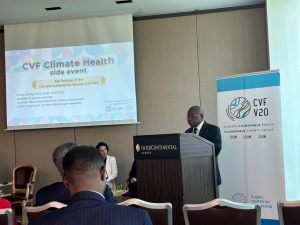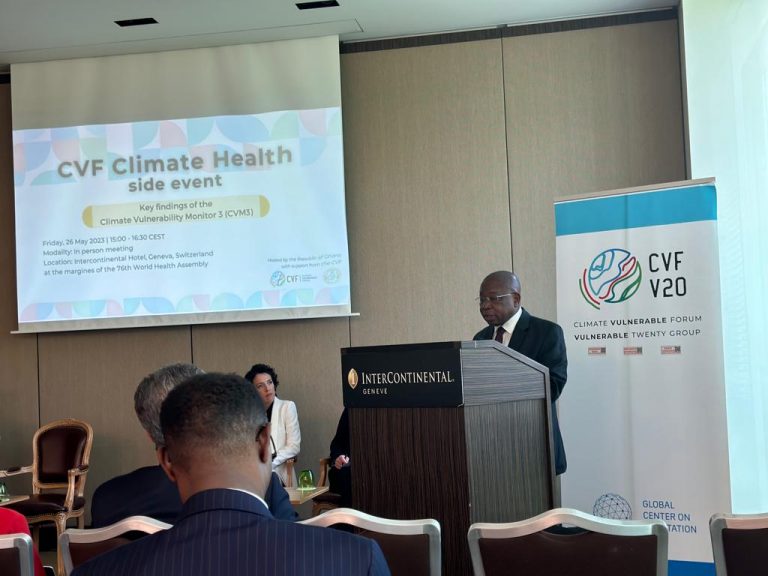CVF Climate Health Side Event: Key findings of the Climate Vulnerability Monitor 3 at the 76th World Health Assembly
Statement Delivered by the Minister of Health of Ghana, Hon. Kwaku Agyeman-Manu

Geneva, Friday, 26th May, 2023 at 3pm
Excellences, colleague Ministers of Health
Excellences, Ambassadors, Permanent Representatives and Heads of Delegations
Distinguishes guests
Ladies and gentlemen
It is a great pleasure to be here today on behalf of the Government of Ghana (the current CVF Presidency), to address this important gathering organised to draw attention to the impact of climate change on health and to discuss the key findings in the report by the Climate Vulnerable Forum entitled “the Climate Vulnerability Monitor, 3rd edition: A Planet on Fire”
As we all know, climate change poses a significant threat to the health of people and the planet. The devastating impacts of climate change on our environment, health, economy, and infrastructure are well-documented, and the poorest and most vulnerable populations are affected the most.
In Ghana, we are experiencing an increase in the frequency and intensity of extreme weather events, such as floods and droughts that have a significant impact on the health and wellbeing of our citizens.
The purpose of this gathering therefore is to call on all stakeholders to commit to the noble goals and ideals of the CVF and to collaborate in addressing the climate problems facing our countries, communities and economies;
Like many CVF member states, Ghana is in the process of completing its climate prosperity plan, and would appreciate ideas and experiences to enrich the plan. I would also like to use this occasion to encourage other CVF Member States who are yet to prepare or complete their climate prosperity plan to do so. The CVF Secretariat and the Ghana presidency are ready to share experiences and offer technical support in this regard.
The Climate Vulnerability Monitor report is a timely reminder of the urgent need for action to combat climate change and its effects. The report highlights the scale of the challenge we face, provides a detailed analysis of the social, economic and environmental impacts of climate change and addresses the urgent need to address the health risks associated with this. It also provides concrete recommendations for policymakers, businesses, and civil society.
As Minister of Health, I am deeply concerned about the impacts of climate change on health. We are already seeing increases in infectious diseases such as malaria and dengue fever due to changing weather patterns. The degradation of the environment is also resulting in pollution of air, water, and soil, leading to respiratory diseases and malnutrition. Furthermore, according to the comprehensive findings of the Climate Vulnerability Monitor, 3rd edition report, a projected rise in global temperatures to 1.5 degrees Celsius within the next decade would lead to a concerning consequence: approximately 12% of regions that have historically been unsuitable for malaria transmission will become newly suitable, which highlights the urgent need for collective action to address climate change and mitigate its adverse effects on public health, particularly in regions susceptible to vector-borne diseases like malaria.
Therefore, I would like to use this occasion to call on all stakeholders to work together to address climate change and to protect the health and wellbeing of our citizens. We must take bold actions to reduce greenhouse gas emissions, develop low-carbon technologies, invest in renewable energy sources, and prioritize climate change adaptation measures, especially in healthcare systems and public health interventions.
In conclusion, let me reiterate Ghana’s commitment to tackling climate change and to reduce the vulnerability of our people to its impacts. I commend the Secretariat of the Climate Vulnerable Forum for producing this important report and urge all stakeholders to take action on its recommendations.
Thank you.


